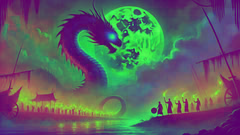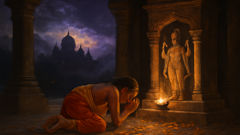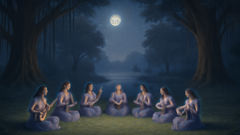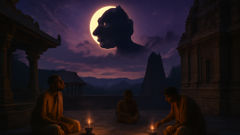Introduction
In the hush of a tropical dusk, when the last birds settle among whispering bamboo and the sea’s breath floats in from the east, the old stories awaken. The islands of the Visayas—scattered like emeralds across the Philippine archipelago—are alive with legends shaped by wind, water, and stars. Among these, none grips the heart quite like the tale of the Bakunawa, the colossal serpent who lurks beneath the waves and dreams of devouring the very moon. It is a story told in the flicker of fireflies and the hush before an eclipse—a story that pulses with fear and fascination, hope and defiance. For generations, children have listened wide-eyed as elders recount how, long before foreign ships crossed these seas, a time of spirits and enchantment reigned. In this world, the moon was not merely a distant light, but a living treasure, fiercely loved and fiercely hunted. On nights when the lunar face began to dim, villagers gathered in trembling anticipation, their bamboo gongs and chants echoing into the darkness, believing that only their unity and courage could drive the monster back. The myth of the Bakunawa is more than a warning or explanation for eclipses—it is a testament to how people, even in the face of the inexplicable, shape their destinies with courage and song. Let us step into a night when the moon trembled and a young girl named Laya discovered that legends are not just for listening, but for living.
I. The Whisper of the Old Moon
Laya pressed her ear to the woven mat, heart thumping in time with the distant, hollow beat of a bamboo gong. The sound was soft but urgent, drifting through the walls of her grandmother’s hut with the scent of river grass and the tang of salt. Outside, fireflies danced in the humid dark, and above them all, the moon hung vast and golden—round as a fisherman’s net and bright enough to cast shadows from every leaf. For as long as she could remember, the moon had been her companion. It watched over the nightly games she played by torchlight and shone on her mother’s laughter as they washed rice in the village stream. Tonight, though, the air was charged with something heavier. Her grandmother, Lola Mayang, sat cross-legged by the open window, lips moving silently. In her wrinkled hands she held a small bowl of water, and in its reflection the moon shimmered, quivering. Laya crept to her side, her own shadow stretching long across the bamboo floor. Lola Mayang glanced down. "The moon listens tonight," she whispered. Her eyes, clouded but fierce, met Laya’s. "Long ago, there were not one, but seven moons—seven sisters who danced across the sky. Their beauty was a blessing, but it caught the gaze of Bakunawa, the serpent below the sea. He rose and swallowed them, one by one. Only this last sister escaped." Laya felt a chill despite the heat. She had heard this tale before, but tonight it felt real. The sound of gongs grew louder outside as villagers gathered, their voices rising in low chants. The moon seemed to waver, and for a heartbeat, Laya thought she saw a ripple move across its surface—a shadow, deep and sinuous, as if something vast and hungry circled far above.

II. The Sky Darkens, the Serpent Rises
The first sign was silence. Birds, always rowdy at dusk, had gone mute. Even the frogs and crickets quieted, as if nature itself sensed the stirring of something immense. Laya stepped onto the porch, hand tight in her grandmother’s grasp. The villagers stood clustered along the riverbank, faces turned upward, their torches flickering like fireflies. In the heavens, the moon’s edge was blurring, its radiant gold paling to a frightened silver. And then—the shadow. It was not the familiar passing of a cloud, but a slow, creeping darkness that bled across the moon’s face. The elders’ gongs sounded, sharp and urgent. "Bakunawa!" someone cried, voice cracking. The name was a spell and a warning, filling the air with dread. Laya’s heart hammered as she imagined the serpent: scales glimmering blue and green, eyes burning with ancient hunger, its body coiling up from the depths to claim its prize. As the shadow deepened, it seemed as if a gigantic jaw had closed around the moon. Panic surged through the village. Old men struck their gongs harder, women flung rice into the air, and children clung to their mothers. Lola Mayang’s voice rose above the din, steady and fierce as the wind before a storm. She thrust a torch high, the flame leaping wild. "Bakunawa feeds on fear," she declared. "But he retreats from our song!" Without waiting for reply, she began to chant—old words in a tongue that tasted of salt and rain. Laya joined in, her voice trembling but growing stronger. The entire village followed, a wave of sound and light crashing against the looming dark. Still, the shadow grew. The moon was now a bitten coin in the sky, its glow dimmed by the serpent’s hunger. Laya closed her eyes, letting the rhythm of the chant fill her. In that moment she felt herself lifted—her voice not just her own, but part of something vast. She glimpsed, in her mind’s eye, the Bakunawa itself: monstrous and beautiful, its body twining through clouds, its mouth agape with longing and loneliness. And beneath its terror, she sensed a sorrow that mirrored the villagers’ fear. The serpent, she thought, was not only an enemy but a creature bound by hunger and fate.

III. The Journey to the Sacred Lake
After the serpent’s shadow finally retreated and the moon began to heal, the village awoke to uneasy relief. But Laya saw something in her grandmother’s eyes—a restlessness that would not sleep. Lola Mayang insisted they walk at dawn to the sacred lake where, it was said, the spirit of the moon hid when pursued by Bakunawa. The path wound through tangled jungle, alive with the calls of hidden birds. Dew clung to every leaf, and the ground was littered with fallen petals. Laya carried a woven basket of offerings: sweet rice cakes wrapped in banana leaves, wild ginger, and three gleaming river stones. As they walked, her grandmother spoke softly. "Every eclipse leaves a scar," she murmured. "The moon needs healing—so do we." The lake was a silent mirror cupped in the valley’s hand. Mist curled on its surface, and the surrounding trees bent close as if listening. Lola Mayang knelt by the shore, tracing ancient sigils in the mud with a bamboo stick. Laya set their offerings upon a flat stone. She watched as ripples shivered outward, breaking the perfect reflection of the sky. Suddenly, a cold wind swept across the water. The surface darkened and swirled. In its center, a shape rose—a silver-scaled dragon’s head, crowned with horns of coral and eyes like molten gold. Bakunawa. For a moment, time held its breath. The serpent’s gaze fell on Laya, not with rage, but with an ancient sadness. "Why do you chase my sister moon?" Laya dared to ask, voice thin as reed. The Bakunawa’s reply was a rumble that trembled through her bones: "I am bound to hunger for her light. Once, I danced among the moons, but loneliness made me ravenous." Lola Mayang whispered a prayer. Laya stepped closer. "We remember you," she said. "We honor you—your longing and your pain. But the moon is our guardian. Let her shine." The serpent watched her, scales shimmering with every color of dawn. Slowly, it lowered its head and drank from the lake. The water glowed. Laya felt something lift—an old burden easing. The Bakunawa slid back beneath the surface, leaving only ripples and a sense of peace.

Conclusion
The moon returned to its fullness that night, blazing silver over the village. The people danced until dawn, their songs a tapestry of gratitude and remembrance. Laya sat by her grandmother’s side, watching the sky with new eyes. She knew now that the world was woven from both fear and hope, from stories older than any elder and dreams braver than any child. Each time the moon waned or the sky darkened, she would remember Bakunawa—not only as a beast of legend, but as a spirit bound by longing and loneliness, craving light as much as any human heart. The villagers kept their gongs ready and their voices strong, knowing that unity and understanding were their greatest shields against darkness. The legend endured, not just as warning but as promise: that even when shadows threaten to devour what we cherish most, courage and compassion can call back the light. And high above, the moon sailed on, bright and serene—a sister who survived, cherished by those below and watched, always, by eyes both mortal and mythic.













